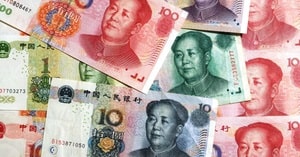As India becomes the global investment hub with sound economic fundamentals and continued policy reforms, China's economic woes continue to take centre-stage globally as the post-Covid recovery path has been bumpy, uneven, and a lot weaker than markets expected and policy responses have been stingy at best, according to a report on Thursday.
Elevated real interest rates and guarded fiscal response are hurting growth while structural economic malaises are mounting in China.
"China’s excess savings paradox amid waning investment has created persistent and large macro imbalances, especially with falling current account surplus," according to the report by Emkay Global Financial Services.
China’s re-opening rebound was one of the biggest market bets gone wrong in 2023, with the housing market (60 per cent of household assets) seeing the worst downturn in China’s history, dragging down growth and consumption.
The report mentioned that the consequent deflationary state has compelled policies to be more growth-friendly, but fears are mounting over China staring at decades of stagnation ahead – debt deflation trap and ‘Japanification’ risks.
China’s slowdown is structural, caused by the end of an unprecedented expansion in credit and investment over the past decade. Amid persistently weak domestic demand, China’s reversion to its ‘old’ growth model has also been witnessed in recent years – from the consumption-driven model back to the manufacturing and exports-based model, to rekindle growth. For the worst to be over, consumption and business sentiment and, consequently, the housing market needs substantial policy support, especially as real rates have risen meaningfully.
"However, fixing policy distortions (led by major market reforms) and restoring confidence are critical to maximise sustainable growth," the report noted.
Last month, India became the sixth-largest market in the MSCI All Country World Investable Market Index (ACWI IMI), surpassing China. The global index tracks capital market performance across the world. The index includes large- and mid-cap stocks and is a more inclusive version of the widely tracked MSCI ACWI Index.
India’s weight in the MSCI ACWI IMI stood at 2.35 per cent in August, 11 basis points higher than China’s 2.24 per cent.
Moreover, strong fundamentals helped India pip China in the MSCI Emerging Market (EM) IMI too, to become the largest weight. The International Monetary Fund’s (IMF) ‘World Outlook Report’ showed in August that India is the fastest-growing economy in 2024 with a growth rate of 7 per cent, followed by China with an estimated growth rate of 5 per cent.
According to the Emkay Global report, the "excess savings" paradox amid waning investment has created a persistent and large macro imbalance, especially as China’s current account surplus is falling.
"Change in fiscal strategy and higher government dis-savings (despite large fiscal debt) are needed to correct the excess HH (household) savings imbalance," the report said.
That said, the report revealed that in modern history, a consumption rise of over 10ppts in a decade has only occurred 11 per cent of the time, thus displaying how daunting a task China’s policymakers are facing to make the consumption model successful. The government’s reaction to these weakening fundamentals has been far from adequate.
"We believe more fiscal easing is needed to offset disinflationary forces and restore confidence, and additional monetary easing is required to lower borrowing costs," the report added.




BJP govt maintains zero tolerance on corruption, claims Tripura CM
The Chief Minister, while addressing a gathering at Baradowali, on the outskirts of the capital city, said that Prime Minister Narendra Modi, on Sunday, in his 120th episode of ‘Mann Ki Baat’ programme, highlighted so many things from across the country that people were previously unaware of.
To mitigate flood crisis AMC begins work of scientific drainage: Shailesh
In a bid to tackle recurring urban flooding, the Agartala Municipal Corporation (AMC) has embarked on an ambitious drainage construction initiative, leveraging scientific techniques to revamp the city's water management infrastructure.
Sushanta inspects Sekerkot fuel depot, aims for timely completion
Food, Civil Supplies and Consumer Affairs Minister, Sushanta Chowdhury, on Sunday, instructed officials to accelerate the construction of the state's largest fuel storage depot in Sekerkot, Sepahijala district.
AFSPA extended in Manipur, parts of Nagaland, Arunachal for another 6 months
The Ministry of Home Affairs (MHA) on Sunday extended the Armed Forces (Special Powers) Act for another six months in certain parts of Manipur, Arunachal Pradesh and Nagaland, officials said, adding that further extension of the law would be effective from April 1.
PM Modi slams Cong for decades of 'neglect' & underdevelopment in Chhattisgarh
Prime Minister Narendra Modi on Sunday strongly criticised the previous Congress governments for years of neglect towards Chhattisgarh, accusing it of plunging the state into a prolonged era of darkness and underdevelopment.
Navy ships from Andaman to carry relief material to quake-hit Myanmar
Indian Navy ships Karmuk and LCU 52 from the Andaman and Nicobar Command will also be sailing for Yangon on Sunday to boost ‘Operation Brahma’ to render assistance to earthquake-hit Myanmar.
IAF’s Su-30 MKI to display skills in multinational exercise in Greece
Aiming to hone skills against a dozen other counterparts, including the US, Israel, and France, the Indian Air Force (IAF) will be participating in biennial multinational air exercise INIOCHOS-25, starting in Greece from Monday, an official said.